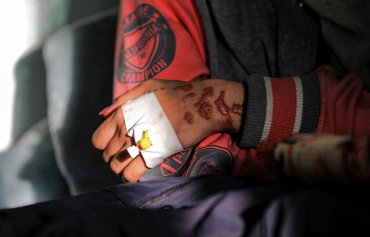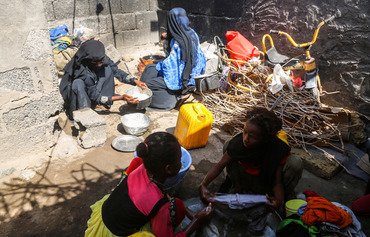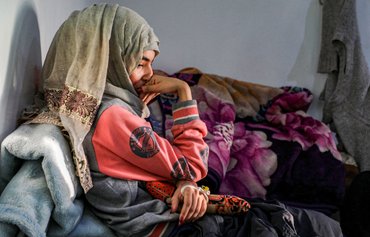ADEN -- The Iran-backed Houthis arrested some 88 women in the northwestern province of Hajjah without legal warrants during July, according to the National Committee to Investigate Alleged Violations of Human Rights (NCIAVHR).
Rights organisations say imprisoning these women, which is the latest in a long history of illegal and harassing acts against women, is a criminal act and are calling for the Houthi officials involved to be punished for their actions.
The committee is investigating the arrests, collecting information and conducting interviews separately on each case, NCIAVHR spokeswoman Ishraq al-Maqtari told Al-Mashareq.
The arrests started in al-Haswa village in Hajjah, with preliminary findings indicating that the women, who were found to have been abused in detention, were detained under the pretext of having committed "moral crimes", she said.
![Rights group spokeswoman Ishraq al-Maqtari interviews women from Taez who were subjected to various abuses by the Houthis. [National Committee to Investigate Alleged Violations of Human Rights]](/cnmi_am/images/2022/08/19/36646-Rights-group-spokeswoman-600_384.jpg)
Rights group spokeswoman Ishraq al-Maqtari interviews women from Taez who were subjected to various abuses by the Houthis. [National Committee to Investigate Alleged Violations of Human Rights]
The Houthis unlawfully conducted searches in the women's houses, besieged their houses with armed men and intimidated the detainees, she said.
A number of female university students also were detained in their dormitories in Abs, Haradh and Ash-Sharafayn districts during the same period, she said, and more than 88 women were taken to the Houthis' central prison.
'Disgraceful and unacceptable'
The committee is investigating arrests reported by the Geneva-based organisation SAM for Rights and Liberties and the Coalition of Women for Peace in Yemen, al-Maqtari said.
"Armed forces affiliated with the Houthis kidnapped about 60 girls in less than a month in Hajjah province and placed them in the province's central prison", SAM said in a July 27 statement.
Additionally, it said, several Houthi personnel raided women's gatherings and houses in Hajjah.
It named them as Mohammed al-Madwami, deputy director of criminal investigation in Hajjah city; security chief Mohammed Salbah and another Houthi official, Hisham Wahban.
Yemeni officials and human rights activists said the Houthis had falsely accused the women of prostitution, without offering evidence to support their allegations, Arab News reported July 25.
This is "a full-fledged kidnapping crime that does not take into account the legal regulations imposed by law in the arrest of accused persons or suspects", SAM said, calling on the Houthis to release the detained women immediately.
Defaming women
The Women's Coalition for Peace in Yemen said the kidnapped girls had become the subject of Houthi rumours, defamation and false accusations aimed at humiliating them and blackmailing their families.
The group said it would turn over the information it has gathered on the victims and their detention to the investigative committee.
A number of the women are being held in the Nasiriyah prison in Hajjah, while some others are in the Mansoura Centre, a former education office turned into a Houthi prison, Coalition President Noura al-Jarawi told Al-Mashareq.
"The coalition reported on the list of detained women and the names of the Houthi leaders who carried out the arrests, including Raoufa al-Shahari, who leads the Zainabiyat team in Hajjah," al-Jarawi said.
The coalition's report documented the raids and arrests of women and the names of the involved Houthi leaders with the intention of submitting it to the United Nations (UN) and the UN Security Council's Panel of Experts, she said.
Al-Jarawi has previously reported on the physical and mental torture that a number of female prisoners have endured at the hands of the Houthis while incarcerated in their prisons.
Last year, the UN Security Council imposed sanctions on Sultan Zabin, director of the Criminal Investigation Department (CID) in Sanaa.
Zabin, a top Houthi security official, played a prominent role in a policy of intimidation and the use of torture, sexual violence and rape against politically active women.
He bears direct responsibility for a number of cases of harm to women and at least case affecting a minor, the UN said.
Violations on a larger scale
The number of detainees may be much higher than the publicly available figures, as only some families were able to report the abuses to rights groups, lawyer and human rights activist Abdul Rahman Berman told Al-Mashareq.
"Many of the girls' families do not report the abduction or disappearance of women," he said, as such news is perceived to bring "dishonour, shame and scandal" to the families and their community.
The arrest and imprisonment of women are part of a "systematic plan carried out by the group, not only in Hajjah but previously in Sanaa, Ibb and other areas, to collect money and blackmail families", Berman said.
Some of the women are released only if their families pay ransom, he said, while in other cases, the arrests are aimed at pressuring their families, if they take a political stance opposing the Houthis' actions and policies.

![Rights group spokeswoman Ishraq al-Maqtari interviews women from Taez who were subjected to human rights violations by the Houthis. [National Committee to Investigate Alleged Violations of Human Rights]](/cnmi_am/images/2022/08/19/36644-Ishraq-al-Maqtari-600_384.jpg)






